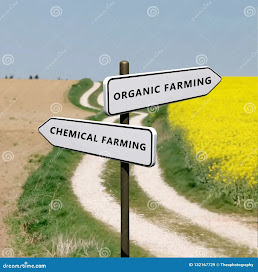🌱 "Organic Farming vs Chemical Farming": Which is Better for Our Future?
In the modern world of agriculture, the battle between organic farming and chemical farming is more than just a debate—it's a global concern that impacts our health, environment, and economy. With consumers becoming more conscious of what they eat, the question arises:
Organic or chemical—what truly feeds us best?
Let’s dig deep into this green-versus-gray tug-of-war and find out which farming method actually wins the crown. 👑
🌾 What is Organic Farming?
Organic farming is a natural method of agriculture that avoids synthetic chemicals. Instead, it relies on:
-
Compost, green manure, and biofertilizers 🌿
-
Biological pest control (like ladybugs or neem oil) 🐞
-
Crop rotation and mixed cropping
-
Natural soil amendments like cow dung or vermicompost
In short, organic farming works with nature, not against it.
✅ Benefits of Organic Farming:
-
Healthier produce: No harmful chemical residues.
-
Environmental protection: Protects biodiversity and soil health.
-
Sustainability: Replenishes the ecosystem for future generations.
-
Better taste and nutrition (many say so!).
⚗️ What is Chemical Farming?
Chemical farming, also called conventional or industrial farming, involves:
-
Synthetic fertilizers like urea, DAP, and NPK
-
Pesticides and herbicides to control pests and weeds
-
Genetically modified seeds in some cases
-
Mechanization and high-yield techniques
This method is mainly focused on maximum productivity in the shortest time.
✅ Benefits of Chemical Farming:
-
Higher crop yields in the short term 🌽
-
Faster growth and harvest time
-
Reduced manual labor due to machines and chemical weed control
-
Often cheaper for large-scale production
🔬 A Side-by-Side Comparison
| Feature | Organic Farming 🌱 | Chemical Farming ⚗️ |
|---|---|---|
| Health Impact | Safe, chemical-free produce | Residue risk, may affect health |
| Soil Fertility | Improves soil over time | Depletes soil quality gradually |
| Cost to Start | Higher initially | Lower startup cost |
| Long-Term Profit | More sustainable & premium | Can be volatile due to soil damage |
| Impact on Nature | Eco-friendly, supports life | Pollutes water, harms insects |
| Government Support | Increasing subsidies & demand | Already well-established |
⚠️ The Downside of Chemicals
Though chemical farming has helped in Green Revolutions, it has also caused:
-
Soil erosion and infertility
-
Water contamination
-
Pesticide resistance in insects
-
Health issues like cancer, hormone disruption, and allergies
💡 So, Which One is Better?
👉 Short-term?
Chemical farming is faster and cheaper.
👉 Long-term?
Organic farming wins for its sustainability, health, and environmental impact.
But here’s the twist:
🌀 The future may not lie in choosing only one approach, but in integrating the best of both—also known as integrated or regenerative farming.
🌍 What Can We Do?
-
Start a small organic garden at home 🏡
-
Buy from local organic farmers' markets 🛒
-
Spread awareness of food choices through social media 📱
-
Support policies that promote sustainable farming 👩🌾
📢 Final Thought
In the race between organic vs chemical farming, nature is the ultimate judge.
Every seed we sow today shapes the food, health, and soil of tomorrow. So, before your next bite—ask yourself:
🌾 “Is it just filling your stomach, or is it nourishing your life?”



.jpg)


Comments
Post a Comment